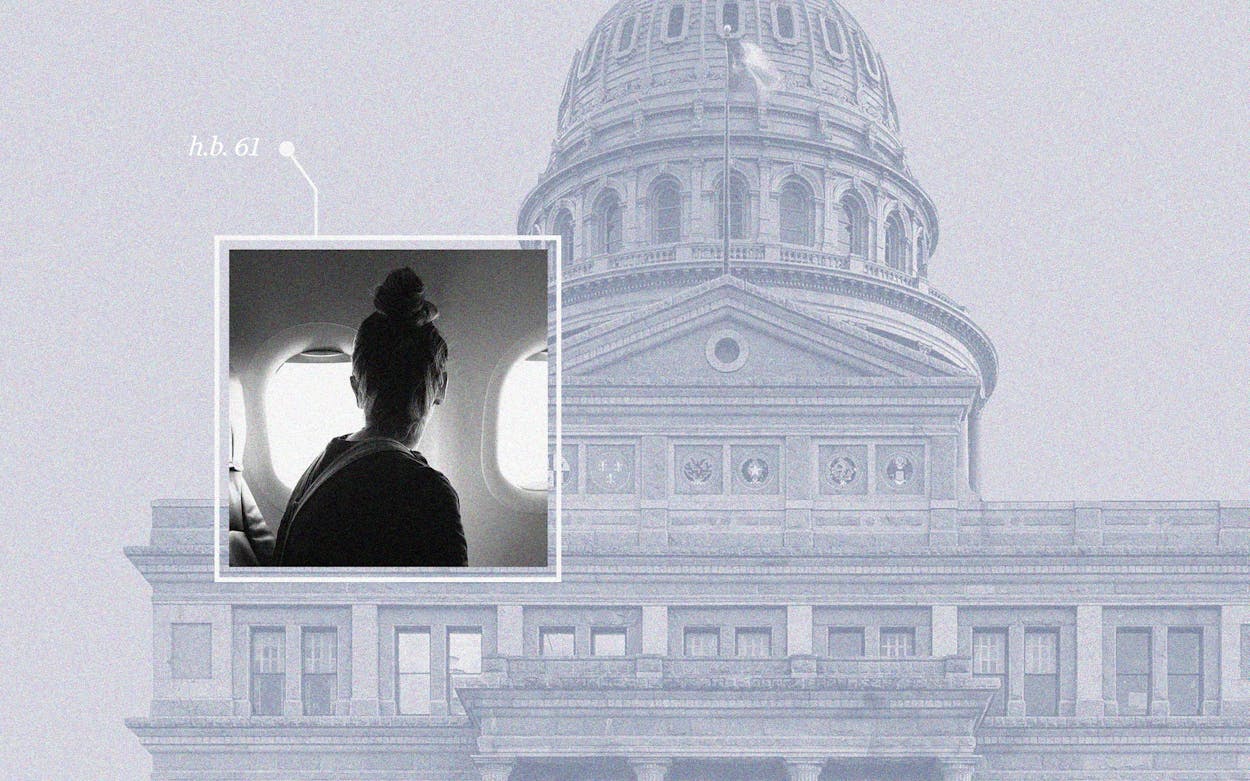The bill: House Bill 61
Filed by: Candy Noble, Republican, District 89 (Lucas, northeast of Dallas)
What it would do: The bill would prohibit a governmental entity from entering into a “taxpayer resource transaction” or spending money to provide any person with logistical support for abortion care. As defined by the legislation, logistical support includes travel to or from an abortion provider, lodging, food, childcare, counseling, and “any other service that facilitates the provision of an abortion.” The bill allows Attorney General Ken Paxton to file suit and recover attorney’s fees if a city violates the potential law.
The Republican lawmaker’s bill is the latest in a long line of not-so-subtle attacks on the city of Austin’s support for abortion care. A 2019 law (Senate Bill 22) passed by the Legislature directly barred local governments from contracting with abortion providers and affiliates, a thinly veiled shot at Austin for its $1-a-year, decades-long lease agreement with an East Austin Planned Parenthood clinic that offered only preventative health services, such as birth control and cancer screenings. (State and federal taxpayer dollars could not flow toward abortion procedures directly, despite what Republican lawmakers have said. The one local hospital district in Texas that did use local tax dollars for abortion services ceased that care after a 2011 state law—which, again, intentionally targeted Travis County, home of Austin—threatened to withhold state money from it.)
In 2019, Austin found a way to work around SB 22: if the city was banned from directly contracting with abortion providers, then it could offer funds to aid groups providing logistical support for abortion, including childcare, hotel rooms, gas for car trips, and plane tickets. The city council made an unprecedented investment in abortion funds, first with a $150,000 infusion in 2019 that was later supplemented through a historic reallocation of Austin Police Department funds. The first of its kind in the nation, the abortion support services program transfers money through Austin Public Health to abortion assistance groups such as Jane’s Due Process and Fund Texas Choice. The measure was the liberal city’s rebuff to the growing number of small conservative towns in Texas adopting “sanctuary city for the unborn” ordinances.
Abortion funds throughout the state recently halted the type of logistical support that Noble targets, fearing criminal liability over the state’s “trigger law,” which went into effect in August and carries a felony punishment of up to life in prison for performing an abortion. A group of abortion funds sued Attorney General Ken Paxton in late August, citing their First Amendment right to speech through charitable donations and asking for legal protection to continue to help abortion-seeking Texans, including by raising money for travel and other logistical support. The funds await a ruling on their request for a preliminary injunction from Austin-based U.S. district judge Robert Pitman. But when—or, perhaps, if—abortion funds are able to resume operations, Noble’s bill could prevent Austin—and other cities like it—from financially supporting the funds and their clients.
Noble’s bill is not the first attempt to block the city from trying to assist Texans who are seeking abortions. In 2019, former Austin City Council member Don Zimmerman, a right-winger, filed suit against the city, arguing the abortion services program violated an outdated, but still on the books, state law that placed criminal penalties on anyone who “furnishes the means” for someone getting an abortion. Zimmerman’s legal reasoning appeared at odds with nearly fifty years of abortion rights precedents, and a Travis County judge ruled against him. However, the case now has new life: after the U.S. Supreme Court’s Dobbs decision in June, the Texas Supreme Court vacated all previous rulings on Zimmerman’s case and remanded the suit back to trial court.
Does the bill have a chance of passing? Yes, it does. It melds the GOP’s perennial Austin-bashing with its desire to restrict abortion rights. HB 61 likely won’t be the last legislative shot at Austin and other abortion-friendly cities, especially as the Capital City, Dallas, and San Antonio have taken bold stances to protect their citizens from abortion prosecution, through either resolutions that seek to decriminalize abortion or promises from district attorneys to refrain from going after providers. Some anti-abortion lawmakers have already vowed to introduce measures that would empower local district attorneys to prosecute abortion crimes in other jurisdictions when a county’s DA fails to do so.
Noble’s attempt to pass this bill last session never got to a vote, while the bill’s Senate counterpart, filed by Donna Campbell, a Republican from New Braunfels, sailed through the upper chamber. The bill could feasibly pass this session, but it may end up sidelined and overshadowed by the more pressing anti-abortion priorities discussed among conservative lawmakers, including expanding the power of local DAs to prosecute, adding barriers to out-of-state travel for abortion-seekers, and blocking access to medication abortion websites, among other potential proposals.
- More About:
- Politics & Policy
- Texas Legislature
- Abortion
- Austin






